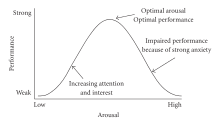Sport and Competition
Why Do Top Athletes Choke Under Pressure?
The psychological mechanisms behind the stress and pressure of peak performance.
Posted February 11, 2022 Reviewed by Tyler Woods
Key points
- Professional athletes are expected to perform well at the most important tournaments, however often they choke under pressure.
- High expectations may provoke choking under pressure.
- The drop of performance happens when people consciously monitor skill-based processes that are best executed as automated actions.
According to classic economic theory, the higher the reward, the better the expected performance. Thus, we could expect the best performance at the most important moments. For Olympic athletes, there is no more important competition than the Olympic Games. So, why do we so often see the most talented and experienced athletes, those who were considered clear favorites, perform much worse than expected?
A recent, unfortunate example is alpine skier Mikaela Shiffrin. Prior to the 2022 Olympics in Beijing, she had won 73 individual races at the World Cups. Shiffrin is the most decorated American alpine skier in world championship history. However, in her first two races at the Olympics, she failed to finish two consecutive races for the first time in her career. She is obviously not the only example. Simone Biles, the superstar American gymnast was unable to compete in several of her best events due to a mental collapse.

Why the drop in performance?
It is not necessarily true that there's a direct relationship between incentives and achievement. Psychological research has shown that increased motivation beyond an optimal level may harm an athlete's performance. In academia, we call this phenomenon, "choking under pressure." In the same spirit, greater incentives may lead to higher levels of arousal. According to the Yerkes-Dodson law, the relationship between performance and arousal resembles an inverted U shape, meaning that performance is optimal at moderate levels of arousal and declines with over-arousal.
There are many studies that have shown that increased pressure has a negative effect on the performance of professional athletes. For example, one of my studies shows that professional tennis players make more mistakes in decisive games. Another study found that basketball players hit free throws at a significantly higher percentage while training than they did during games. In the same spirit, higher stakes in professional golf increase the likelihood of missing a shot on the final hole.
This drop in performance occurs when people consciously monitor skill-based processes that are best executed as automated actions. One study found that a complex sensorimotor task is best performed when executed as an automated action. Overthinking or monitoring each step is likely to end with choking.
High expectations as a trigger to choking under pressure
In the case of Simone Biles and Mikaela Shiffrin, beyond the pressure associated with the Olympic Games, there was another factor that may have added pressure: the level of expectations. A lab experiment indicated that high audience expectations harms performance in a skill-based task. This phenomenon exists not only in laboratory conditions, but also in sports. For example, one of the most-titled biathletes in history, Martin Fourcade, said that it was very emotional for him to compete in his home country and also much tougher than competing abroad because of greater expectations.
Myself and Ken Harb-Wu tested this home disadvantage by using data from all biathlon competitions at the World Cup, World Championship, and Olympic Games over a period of 17 years. We found that the most titled athletes miss significantly more shots when competing in their home country compared to when they compete abroad. There was no such effect among lower-ability athletes. The most plausible explanation of this finding likely relates to the level of expectations from the local favorites.
How to deal with it?
There are several techniques to reduce stress, such as a countdown or taking a deep breath before the task. But the most important thing is to recognize that stress affects performance. Despite a growing recognition of mental issues in professional sports, many athletes, especially outside the U.S. refuse to recognize the importance and scope of the issue. Choking under pressure can happen to the best athletes (e.g., Biles, Osaka, Shiffrin, etc.) and it's not a shame to admit it. Sports psychology has started to become popular with teams and athletes, but the more any athlete knows about the impact pressure and arousal can have on them, the more likely they are to succeed at the highest level.
References
Baumeister, R. F. (1984). Choking under pressure: self-consciousness and paradoxical effects of incentives on skillful performance. Journal of Personality and Social Psychology, 46(3), 610.
Baumeister, R. F., Hamilton, J. C., & Tice, D. M. (1985). Public versus private expectancy of success: Confidence booster or performance pressure?. Journal of personality and social psychology, 48(6), 1447.
Beilock, S. L., & Carr, T. H. (2001). On the fragility of skilled performance: What governs choking under pressure?. Journal of Experimental Psychology: General, 130(4), 701.
Cohen-Zada, D., Krumer, A., Rosenboim, M., & Shapir, O. M. (2017). Choking under pressure and gender: Evidence from professional tennis. Journal of Economic Psychology, 61, 176-190.
Dandy, J., Brewer, N., & Tottman, R. (2001). Self-consciousness and performance decrements within a sporting context. The Journal of Social Psychology, 141(1), 150-152.
Harb-Wu, K., & Krumer, A. (2019). Choking under pressure in front of a supportive audience: Evidence from professional biathlon. Journal of Economic Behavior & Organization, 166, 246-262.
Hickman, D. C., & Metz, N. E. (2015). The impact of pressure on performance: Evidence from the PGA TOUR. Journal of Economic Behavior & Organization, 116, 319-330.
Mesagno, C., & Mullane-Grant, T. (2010). A comparison of different pre-performance routines as possible choking interventions. Journal of Applied Sport Psychology, 22(3), 343-360.


